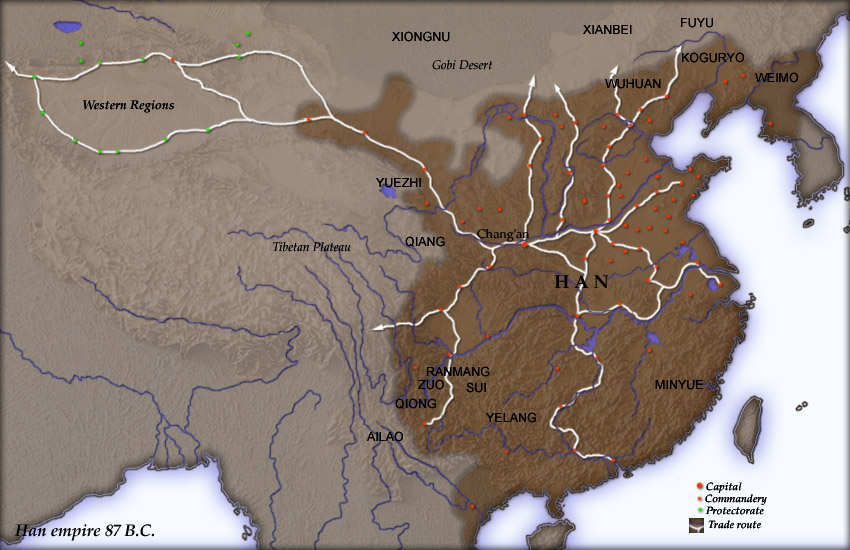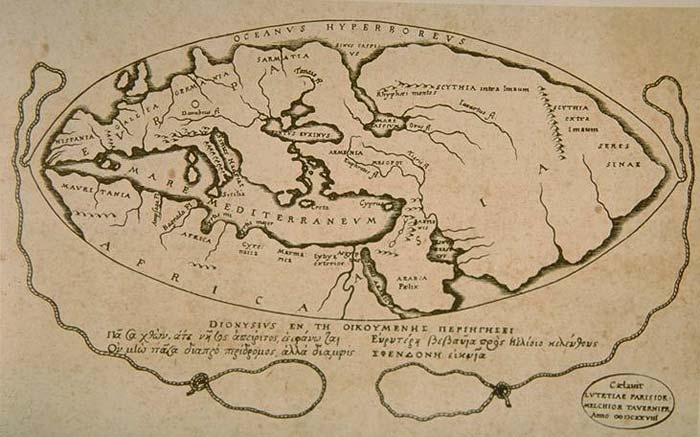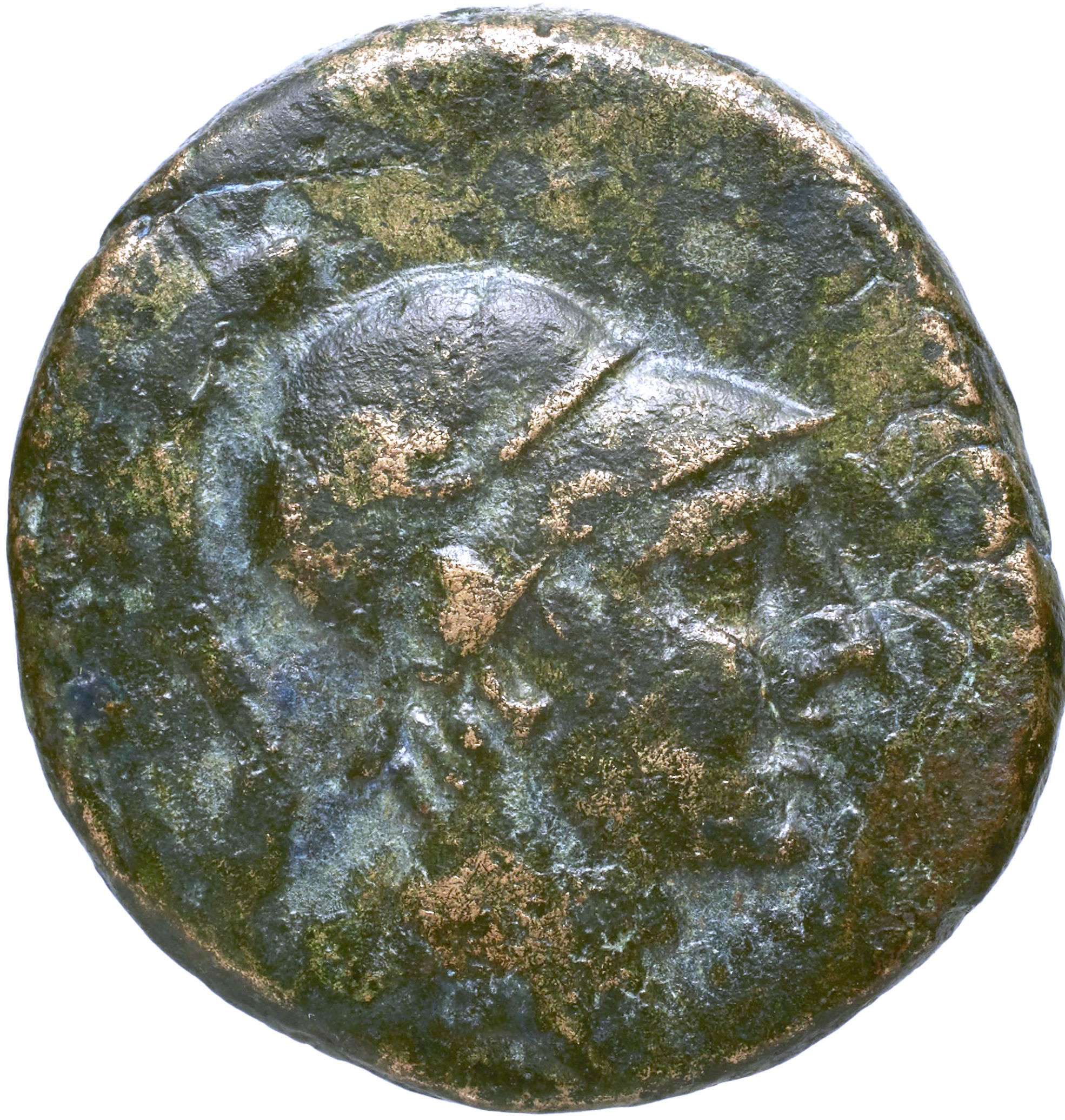|
135 BC
__NOTOC__ Year 135 BC was a year of the pre-Julian Roman calendar. At the time it was known as the Year of the Consulship of Flaccus and Piso (or, less frequently, year 619 ''Ab urbe condita'') and the Sixth Year of Jianyuan. The denomination 135 BC for this year has been used since the early medieval period, when the Anno Domini calendar era became the prevalent method in Europe for naming years. Events By place Roman Republic * The First Servile War starts in Sicily. * Servius Fulvius Flaccus defeats an uprising of the Ardiaei in Illyria. * Marcus Cosconius defeats the Scordisci in Thrace. Bactria * Menander I, king of the Indo-Greek Kingdom dies and is succeeded by Epander. China * Grand Empress Dowager Dou dies, which allows her grandson Emperor Wu to exert greater control over the empire. * Minyue attacks Nanyue, which are both vassal states of the Han Dynasty. The Han send two armies against Minyue under Wang Hui and Han Anguo, and Minyue's king Zou Ying i ... [...More Info...] [...Related Items...] OR: [Wikipedia] [Google] [Baidu] |
Roman Calendar
The Roman calendar was the calendar used by the Roman Kingdom and Roman Republic. The term often includes the Julian calendar established by the reforms of the Roman dictator, dictator Julius Caesar and Roman emperor, emperor Augustus in the late 1stcenturyBC and sometimes includes any system dated by inclusive counting towards months' kalends, nones (calendar), nones, and ides (calendar), ides in the Roman manner. The term usually excludes the Alexandrian calendar of Roman Egypt, which continued the unique months of that land's Egyptian calendar, former calendar; the Byzantine calendar of the Byzantine Empire, later Roman Empire, which usually dated the Roman months in the simple count of the ancient Greek calendars; and the Gregorian calendar, which refined the Julian system to bring it into still closer alignment with the tropical year. Roman dates were counted inclusively forward to the next of three principal days: the first of the month (the kalends), a day shortly befor ... [...More Info...] [...Related Items...] OR: [Wikipedia] [Google] [Baidu] |
Han Campaigns Against Minyue
The Han campaigns against Minyue were a series of three Han military campaigns dispatched against the Minyue state. The first campaign was in response to Minyue's invasion of Eastern Ou in 138 BC. In 135 BC, a second campaign was sent to intervene in a war between Minyue and Nanyue. After the campaign, Minyue was partitioned into Minyue, ruled by a Han proxy king, and Dongyue. Dongyue was defeated in a third military campaign in 111 BC and the former Minyue territory was annexed by the Han Empire. Background The Qin dynasty's military incursions in the south of what is now China began a period of expansion that continued under the next dynasty, the Han. After the fall of the Qin, Minyue was established in 202 BC, and Eastern Ou in 192 BC, with the support of the Han. They were rewarded with greater autonomy in return for their contributions to the revolt against the Qin. The local rulers of the Minyue region had also sided with Liu Bang's Han instead of Xia ... [...More Info...] [...Related Items...] OR: [Wikipedia] [Google] [Baidu] |
Sima Qian
Sima Qian (; ; ) was a Chinese historian of the early Han dynasty (206AD220). He is considered the father of Chinese historiography for his ''Records of the Grand Historian'', a general history of China covering more than two thousand years beginning from the rise of the legendary Yellow Emperor and the formation of the first Chinese polity to the reigning sovereign of Sima Qian's time, Emperor Wu of Han. As the first universal history of the world as it was known to the ancient Chinese, the ''Records of the Grand Historian'' served as a model for official history-writing for subsequent Chinese dynasties and the Chinese cultural sphere (Korea, Vietnam, Japan) up until the 20th century. Sima Qian's father Sima Tan first conceived of the ambitious project of writing a complete history of China, but had completed only some preparatory sketches at the time of his death. After inheriting his father's position as court historian in the imperial court, he was determined to fulfill ... [...More Info...] [...Related Items...] OR: [Wikipedia] [Google] [Baidu] |
51 BC
__NOTOC__ Year 51 BC was a year of the pre-Julian Roman calendar. At the time, it was known as the Year of the Consulship of Marcellus and Sulpicius (or, less frequently, year 703 ''Ab urbe condita''). The denomination 51 BC for this year has been used since the early medieval period, when the Anno Domini calendar era became the prevalent method in Europe for naming years. Events By place Roman Republic * Consuls: Marcus Claudius Marcellus and Servius Sulpicius Rufus. * Pompey demands that Julius Caesar lay down his command before he can stand for consul. Egypt * Spring – King Ptolemy XII (Auletes) dies and is succeeded by his eldest surviving daughter Cleopatra VII and her younger brother Ptolemy XIII as co-rulers of the Ptolemaic Kingdom. Asia * The Xiongnu split into two hordes. The Eastern horde is subject to China. Births * Cheng, Chinese emperor of the Han Dynasty (d. 7 BC) * Publius Sulpicius Quirinius, Roman aristocrat (d. 21 AD) Deaths * ... [...More Info...] [...Related Items...] OR: [Wikipedia] [Google] [Baidu] |
Stoicism
Stoicism is a school of Hellenistic philosophy founded by Zeno of Citium in Athens in the early 3rd century Common Era, BCE. It is a philosophy of personal virtue ethics informed by its system of logic and its views on the natural world, asserting that the practice of virtue is both necessary and sufficient to achieve Eudaimonia, (happiness, ): one flourishes by living an Ethics, ethical life. The Stoics identified the path to with a life spent practicing the cardinal virtues and living in accordance with nature. The Stoics are especially known for teaching that "virtue is the only good" for human beings, and that external things, such as health, wealth, and pleasure, are not good or called in themselves (''adiaphora'') but have value as "material for virtue to act upon". Alongside Aristotelian ethics, the Stoic tradition forms one of the major founding approaches to virtue ethics. The Stoics also held that certain destructive emotions resulted from errors of judgment, and th ... [...More Info...] [...Related Items...] OR: [Wikipedia] [Google] [Baidu] |
Posidonius
Posidonius (; grc-gre, wikt:Ποσειδώνιος, Ποσειδώνιος , "of Poseidon") "of Apamea (Syria), Apameia" (ὁ Ἀπαμεύς) or "of Rhodes" (ὁ Ῥόδιος) (), was a Greeks, Greek politician, astronomer, astrologer, geographer, historian, mathematician, and teacher native to Apamea, Syria. He was considered the most learned man of his time and, possibly, of the entire Stoicism, Stoic school. After a period learning Stoicism, Stoic philosophy from Panaetius in Athens, he spent many years in travel and scientific researches in Spain, Africa, Italy, Gaul, Liguria, Sicily and on the eastern shores of the Adriatic. He settled as a teacher at Rhodes where his fame attracted numerous scholars. Next to Panaetius he did most, by writings and personal lectures, to spread Stoicism to the Roman world, and he became well known to many leading men, including Pompey and Cicero. His works are now lost, but they proved a mine of information to later writers. The titles an ... [...More Info...] [...Related Items...] OR: [Wikipedia] [Google] [Baidu] |
87 BC
__NOTOC__ Year 87 BC was a year of the pre-Julian Roman calendar. At the time it was known as the Year of the Consulship of Octavius and Cinna/Merula (or, less frequently, year 667 ''Ab urbe condita'') and the Second Year of Houyuan. The denomination 87 BC for this year has been used since the early medieval period, when the Anno Domini calendar era became the prevalent method in Europe for naming years. Events By place Roman Republic * Lucius Cornelius Cinna is elected consul of Rome, thus returning the rule of Rome back to the populares faction. * Sulla arrives in Greece and besieges Athens. He orders Lucius Licinius Lucullus to raise a fleet from Rome's allies around the eastern Mediterranean. * Ostia is razed by Gaius Marius as he comes back from Africa with an army to take Rome by force. China * March 29 – Emperor Wu of Han dies after a 54-year reign in which he leads the Han dynasty (China) through its greatest expansion. The Empire's borders span from ... [...More Info...] [...Related Items...] OR: [Wikipedia] [Google] [Baidu] |
Pompey
Gnaeus Pompeius Magnus (; 29 September 106 BC – 28 September 48 BC), known in English as Pompey or Pompey the Great, was a leading Roman general and statesman. He played a significant role in the transformation of Rome from republic to empire. He was (for a time) a student of Roman general Sulla as well as the political ally, and later enemy, of Julius Caesar. A member of the senatorial nobility, Pompey entered into a military career while still young. He rose to prominence serving the dictator Sulla as a commander in the civil war of 83–82 BC. Pompey's success as a general while young enabled him to advance directly to his first Roman consulship without following the traditional '' cursus honorum'' (the required steps to advance in a political career). He was elected as Roman consul on three occasions. He celebrated three Roman triumphs, served as a commander in the Sertorian War, the Third Servile War, the Third Mithridatic War, and in va ... [...More Info...] [...Related Items...] OR: [Wikipedia] [Google] [Baidu] |
Pompeius Strabo
Gnaeus Pompeius Strabo (c. 135 – 87 BC) was a Roman general and politician, who served as consul in 89 BC. He is often referred to in English as Pompey Strabo, to distinguish him from his son, the famous Pompey the Great, or from Strabo the geographer. Strabo's cognomen means "cross eyed". He lived in the Roman Republic and was born and raised into a noble family in Picenum (in the south and the north of the modern regions of Marche and Abruzzo respectively) in Central Italy, on the Adriatic Sea, Adriatic Coast. Strabo's mother was called Lucilia. Lucilia's family originated from Suessa Aurunca (modern Sessa Aurunca) and she was a sister of satiric poet Gaius Lucilius. Lucilius was a friend of Roman general Scipio Aemilianus Africanus, Scipio Aemilianus. Strabo's paternal grandfather was Gnaeus Pompeius, while his father was Sextus Pompeius. His elder brother was Sextus Pompeius (relatives of triumvir Pompey), Sextus Pompeius and his sister was Pompeia (sister of Pompeius Strab ... [...More Info...] [...Related Items...] OR: [Wikipedia] [Google] [Baidu] |
63 BC
__NOTOC__ Year 63 BC was a year of the pre-Julian Roman calendar. At the time it was known as the Year of the Consulship of Cicero and Hybrida (or, less frequently, year 691 ''Ab urbe condita''). The denomination 63 BC for this year has been used since the early medieval period, when the Anno Domini calendar era became the prevalent method in Europe for naming years. Events By place Roman Republic * Lucullus holds a triumph, then retires from war and politics to live a life of refined luxury. * Establishment of the Decapolis and Year 1 of the Pompeian era. * Pompey conquers the people of Phonecia, Coele-Syria, and Judea for the Roman Republic. * Roman annexation of the Seleucid Empire and of Judea as a client kingdom. King Judah Aristobulus II removed from power, while his brother John Hyrcanus II is reappointed king (ethnarch) under Roman suzerainty and high priest, until 40 BC. * Massacre of over 12,000 Jews on the Temple Mount in Jerusalem by Roman troops, in suppo ... [...More Info...] [...Related Items...] OR: [Wikipedia] [Google] [Baidu] |
Kingdom Of Pontus
Pontus ( grc-gre, Πόντος ) was a Hellenistic kingdom centered in the historical region of Pontus and ruled by the Mithridatic dynasty (of Persian origin), which possibly may have been directly related to Darius the Great of the Achaemenid dynasty. The kingdom was proclaimed by Mithridates I in 281BC and lasted until its conquest by the Roman Republic in 63BC. The Kingdom of Pontus reached its largest extent under Mithridates VI the Great, who conquered Colchis, Cappadocia, Bithynia, the Greek colonies of the Tauric Chersonesos, and for a brief time the Roman province of Asia. After a long struggle with Rome in the Mithridatic Wars, Pontus was defeated. The western part of it was incorporated into the Roman Republic as the province Bithynia et Pontus; the eastern half survived as a client kingdom until 62 AD. As the greater part of the kingdom lay within the region of Cappadocia, which in early ages extended from the borders of Cilicia to the Euxine (Black Sea), the king ... [...More Info...] [...Related Items...] OR: [Wikipedia] [Google] [Baidu] |
Mithridates VI Of Pontus
Mithridates or Mithradates VI Eupator ( grc-gre, Μιθραδάτης; 135–63 BC) was ruler of the Kingdom of Pontus in northern Anatolia from 120 to 63 BC, and one of the Roman Republic's most formidable and determined opponents. He was an effective, ambitious and ruthless ruler who sought to dominate Asia Minor and the Black Sea region, waging several hard-fought but ultimately unsuccessful wars (the Mithridatic Wars) to break Roman dominion over Asia and the Hellenic world. He has been called the greatest ruler of the Kingdom of Pontus. He cultivated an immunity to poisons by regularly ingesting sub-lethal doses; this practice, now called mithridatism, is named after him. After his death he became known as Mithridates the Great. Etymology ''Mithridates'' is the Greek attestation of the Persian name ''Mihrdāt'', meaning "given by Mithra", the name of the ancient Iranian sun god. The name itself is derived from Old Iranian ''Miθra-dāta-''. Ancestry, family and early lif ... [...More Info...] [...Related Items...] OR: [Wikipedia] [Google] [Baidu] |



_-_BEIC_6353768.jpg)


.jpg)

